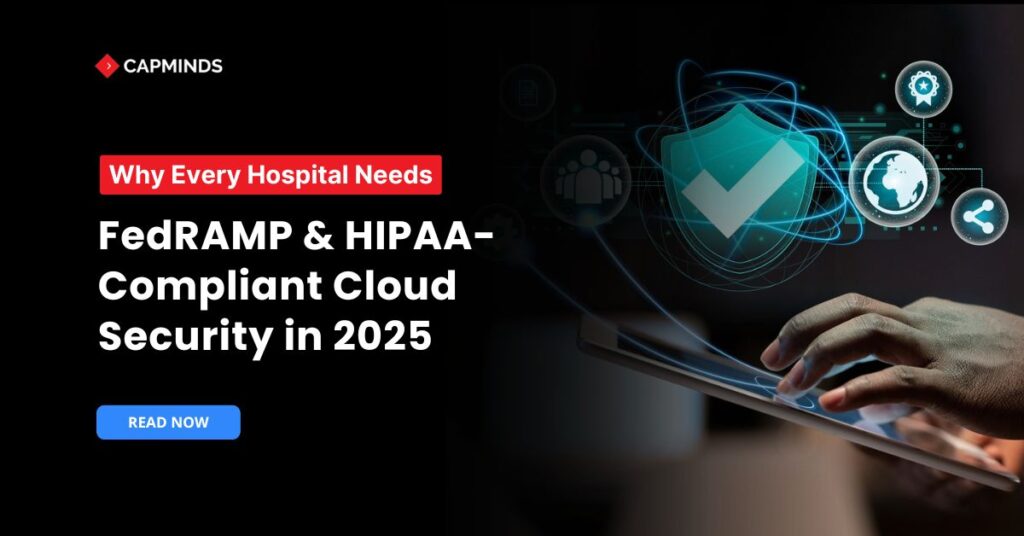Why Every Hospital Needs FedRAMP & HIPAA-Compliant Cloud Security in 2025
Healthcare facing huge cyber threats. According to the report, data breaches were impacting over 167 Million individuals in 2023 alone. To solve this, U.S. regulators have introduced high cybersecurity measures like mandatory multifactor authentication and data encryption.
This is a part of the first major update to the HIPAA Security Rule since 2013. Also, FedRAMP compliance ensures that cloud service providers meet federal security standards to safeguard sensitive patient information. In this blog post, we have shared why every hospital needs to be compliant with FedRAMP and HIPAA cloud security in 2025.
The Rising Cybersecurity Threats in Healthcare
The healthcare industry is significantly getting cyber threats with ransomware, data & security breaches, cloud vulnerabilities, and phishing. According to CPR, 60% increase in cyberattacks on healthcare organizations over the previous year. Healthcare organizations are experiencing 1,426 attacks per week in 2022.
CPR also reports that there is a 32% increase in cyberattacks compared to the same period last year. This demands a proactive security measure to protect patient data and maintain operations.
Some of the common cyber threats the healthcare industry faces are:
- Ransomware: Data encrypted, operations halted, urgent payments demanded, patient safety risk.
- Breaches through Cloud Vulnerabilities: Weak configurations, data leaks, unauthorized access, compliance issues, and patient exposure.
- Phishing Attacks: Deceptive emails, stolen credentials, malware infections, fraudulent requests, identity theft.
- Supply Chain Attacks: Third-party breaches, compromised vendors, software tampering, delayed operations, data exposure.
The Risks of Non-Compliance
If healthcare practices or organizations fail to comply with regulations, the consequences will be severe. This includes:
- Large financial penalties
- Reputational harm
- Loss of patient trust
- Even potential legal consequences for both healthcare professionals and patients.
These consequences impose indirect costs on healthcare organizations because they cause workforce and operational disruption. So, it is important to implement additional security measures, and frequently require the non-compliant entity to outsource compliance.
But patients are the ones who are going to suffer if the healthcare practices are non-compliant.
According to stats, over 37.5 Million health records of patients were exposed in the 64,180 data breaches notified in 2021. Most of the data were used for identity theft, fraud, and other scams.
These consequences will affect individuals in accessing healthcare.
Noncompliance with healthcare regulations can have far-reaching implications. When patients cover up information or fail to follow treatment regimens, an associated decline in care quality raises provider costs and reduces revenue from programs like the Hospital Readmissions Reduction Program.
Poor patient outcomes can also influence staff morale. This will cause healthcare professionals to leave the business due to exhaustion.
What is FedRAMP & HIPAA Compliance?
FedRAMP means Federal Risk and Authorization Management Program. It is a U.S. Government-wide program that standardizes security assessments, authorization, and monitoring for cloud products and security used by federal agencies.
It assures that cloud solutions meet high-security standards for protecting sensitive federal data.
HIPAA means the Health Insurance Portability and Accountability Act. It is a compliance that sets national standards for protecting sensitive patient health information.
Compliance with this regulation will ensure that healthcare organizations and their cloud providers implement necessary safeguards to secure patient data against unauthorized access, breaches, and misuse.
Related: The Ultimate FedRAMP Guide: Everything You Need to Know
Benefits of FedRAMP & HIPAA-Compliant Cloud Security
1. Stronger data protection and encryption
- Ensures robust encryption for data at rest and in transit.
- Implements strict access controls and authentication mechanisms.
- Protects sensitive federal and patient data from cyber threats.
2. Reduced risk of regulatory fines and breaches
- Ensures compliance with legal and regulatory frameworks.
- Reduces exposure to costly fines and penalties due to non-compliance.
- Strengthens security measures to prevent data leaks and breaches.
3. Improved operational efficiency and patient care
- Enables secure cloud adoption for healthcare and government organizations.
- Streamlines workflows with automated security monitoring and reporting.
- Enhances patient care by enabling faster, safer access to health records.
Healthcare organizations can ensure a high level of security and compliance by choosing FedRAMP and HIPAA-compliant clouds.
Related: How Federal Employees Can Maximize Their United Healthcare Benefits with Technology
Steps to Implement Compliant Cloud Security
1. Conducting a security risk assessment
- Assess your existing infrastructure to identify potential vulnerabilities and compliance gaps.
- The document identified risks clearly, including data handling, storage, and transmission practices.
- Develop actionable recommendations to address identified security gaps.
2. Choosing a FedRAMP-authorized cloud provider
Healthcare practices have to choose the right cloud provider with authorized FedRAMP authorization.
There are cloud providers with FedRAMP Authorization like AWS Govcloud, Microsoft Azure Government, or Google Cloud Platform. You need to ensure that they meet your specific compliance and security needs. Here are a few key considerations while choosing a cloud provider:
- Confirm the provider’s certification level aligns with your organization’s compliance requirements.
- Verify that the provider can maintain data residency within required geographic boundaries.
- Evaluate the provider’s track record in managing security breaches and their responsiveness to incidents.
3. Implementing security best practices (MFA, encryption, monitoring)
Implement foundational security practices such as:
- Strengthen account security by requiring multiple verification and security data access point methods.
- Implement robust encryption protocols to secure data both at rest and data in transit.
- Use advanced security tools to detect and respond to security threats promptly.
- Define and implement role-based access control policies to restrict data access based on work roles and responsibilities.
4. Staff training on cybersecurity awareness
After implementing cyber security measures, make sure to train your staff members. Practices need to educate staff continuously regarding cybersecurity risks, consequences, and the best practices for secure. The training program should cover:
- Recognizing phishing attempts
- Secure password management
- Responding to potential security incidents
- Reporting suspicious activities promptly
CapMinds Cloud Security & Compliance Service
CapMinds provides security & compliance services that will make sure your cloud-based applications are secured with confidence.
With our tailored approach, we ensure that your systems meet the strict requirements of FedRAMP, HIPAA, and other regulations providing peace of mind that they are secure, reliable, and compliant.
Also, we go beyond compliance and focus on end-to-end security that encompasses the whole of your infrastructure.
Our cloud security & compliance services include:
- Tackling critical controls across the FedRAMP and HIPAA control families
- Ensuring consistency in security measures throughout all systems;
- Identifying vulnerabilities and assessing risks in real-time;
- Maintaining integrity and security over data;
- Equipping you with the knowledge to maintain compliance.
CapMinds delivers complete solutions for compliance customized to suit every client’s unique need thus making sure that their journey towards FedRAMP and HIPAA is as easy as possible.
Rely on CapMinds for a secure, compliant, and efficient cloud environment.



